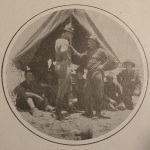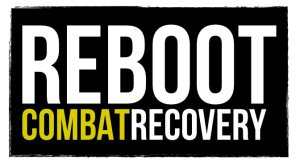The Chaplain’s Job

“President Thomas, of Middlebury College, Vermont, was chaplain of the First Vermont Infantry during its service on the Mexican border last summer [1915]. He is the author of ‘The Christian Faith and the Old Testament’ and he was for many years pastor of a church in East Orange, New Jersey…”
The Chaplain’s Job*
by John M. Thomas
“I did not hold a regimental church. The army has a bugle call for ‘church,’ plaintive, soft, and very beautiful, and some chaplains console themselves for handful audiences by imaginations of mysterious influences supposed to proceed from the mere sounding of the church call.
I wanted something more tangible. So I had a motor truck driven into a company street every Sunday evening and the entire regiment assembled in regular formation before it. Mounted on the truck I read the men letters from home, some from prominent citizens, some form good women who wanted to know what they could do for soldiers, anything to remind the men of the interest the friends back home took in them. Then without scripture, prayer, or hymn, I gave them the highest truth I knew concerning duty to God and man. I tried to divest the essential message of religion of all sectarian accidents and to put the heart of it in language that they could understand and to give it appeal that they could not resist.
“I do not know that I succeeded every time, but as I climbed off the truck on night a man came up to me and said, ‘Chaplain, that was a d—- good talk. Any d—- fool who wouldn’t listen to that ought to be put in the guardhouse…
“I could not find anything in the army regulations to tell me what a chaplain should do for a regiment of Vermont militiamen emptied out on a Rio Grande mesquite field on a July Sunday afternoon. I suppose the ordinary notion of an army chaplain is that of a man who sits around in his tent and prays and reads the Bible until a soldier dies or goes to the hospital. In Civil War times chaplains used to look after the mail, but in those times letters were comparatively few, and a saddle bag was large enough for a post office. Our mail on the border was three or four large sacks a day, and a couple of young enlisted men could handle it better and cheaper that the chaplain.
“But I soon found work enough. Our regiment was short of canvas and in some companies the men were crowded twelve ina tent. They had no cots and slept in their blankets on the ground with the centipedes…
“So I telegraphed back to Vermont or funds for a Y.M.C.A. building, any kind of a shack where the men would have a chance to sit down and read and write home. I got my building very shortly with the help of the International committee of the Y.M.C.A., and it was a Godsend to the regiment. We had all the home papers, plenty of magazines, free stationery, a phonograph with the ‘Five-fifteen’ and the ‘little old Ford’ that ‘rambled right along,’ and the men saw to it that the building was kept full every available hour…
“Unfortunately Mr. Kipling is right that ‘Single men in barracks don’t grow into plaster saints.’ Men in tents in a Mexican border town do not have much better chance. I had no idea of making saints of my Green Mountain boys, but I thought I would try to bring them back no worse than when they left their homes. So I had a ‘Chaplain’s Post Card’ printed, with the motto-
Our whole duty by the old flag and the old state.
Every man a stronger, better man when he gets back to old Vermont.
“I believe they have lived up to that motto and are returning stronger and better men. They have learned much: prompt, exact, and full obedience; respect for superiors; orderliness; cleanliness, and regularity of habit. They caught quickly the soldier’s respect for the flag. They saw something of the vast extent of our country and the immense variety of it. Their minds were broadened and they will be better and more useful citizens from their three months’ experience in the work of a soldier.
“The soldier should not be measured by the standards of Sunday School teachers. He is engaged in rough business and has a great deal of rough, tough work to do. He is apt to offend against the conventionalities, but he knows what an order is, and he will stay in the ranks till he drops, and he would rather face danger than loaf any day. Virtues are qualities which God needs for His work, and the determination of them has been left too much to pale skins in long silk dressing gowns. I had to make a somewhat different list for my khaki men, getting ready, as they thought, for an expedition into bandit-stricken Mexico. Their first duty was to be good soldiers, and for that they needed quick and exact obedience, respect for superiors, orderliness and cleanliness, and grit and patience and self-control. A chaplain who is a man’s man can earn his salary to the full by sympathetic encouragement of the men of his command in the learning of these hard lessons.
“The hardest lesson for a man thrust suddenly from civil life into military responsibility is that he is no longer a citizen entitled to free speech. He must not say anything that could be interpreted as criticism of his superiors, or of the administration of the army, or of the policy of those who control it. Anything bordering at all on politics must be entirely avoided. The President of the United States is Commander-in-Chief of the army, and any criticism of his acts or utterances by an army officer is a serious offense rendering one liable to severe military penalties.
“This restriction is especially difficult for a chaplain, whose profession and duties require him to do a good deal of talking. He must inculcate patriotism, without reference to the vital questions in which patriotic men are interested. He must stir his men to loyalty and to the colors, without any fair and free discussion of what the flag is being made to stand for by the men in highest authority. The very topics in which the thoughtful men in his command would be most interested are the subjects that he must be most careful to avoid.
“I learned that a keen watch is kept on all public utterances even of a militia chaplain. I wrote a letter to the home people which was published in a little country newspaper, in which I said that Texans of the border seemed to have the same high respect for President Wilson’s Mexican policy that Green Mountain Republicans had. It was not two weeks before I was called to account and informed that as an army officer I had no right to make any such observations. It seemed that a United States Senator had noticed my little letter an called on the War Department to silence me, which they did. Such limitations may be necessary to military discipline, but if this country wants strong men as chaplains in its army, men of the resolute personal independence sufficient to exert influence over soldiers, some way must be found to give them a little more freedom of speech.
“I was instructed by my Colonel to make a canvass of the regiment and report the men who had left families at home without sufficient support. I found a large proportion in every company. Such men have no business in the second line of defense, which the National Guard now forms. If the militia is to be federalized, the standards of enlistment should be changed, and only such men kept on the rolls as can leave at any moment for federal service without imposing hardship and destitution upon women and children. Large numbers of the present guard belong in the ‘Landsturm’; they should not be in the second line…
A chaplain has to do with the morale as well as the morals of his regiment. He can do much to keep up the spirits of the men, their heart for the work, and their loyalty to the service. In this respect the chaplains on the border had a difficult task. Their men entered the federal service with the high spirit and enthusiasm of soldiers called to serve their country in the performance of a great national duty. But as the weeks wore away on the Rio Grande they began to question why they had been brought so far and held there. Not a word of explanation was forthcoming. To this day it is debated in militia circles what the whole movement was for. Never before has an American army been called into the field and left so completely in the dark as to why it was summoned and what policy it was depended upon to sustain.
“It was almost impossible to keep up the spirits of the men in such circumstances. The best a chaplain could do was to try to teach the lesson that the first duty of a soldier is to be at home in his shoes, and to be contented anywhere the orders are to stay. I tried to do that, and so far as the First Vermont is concerned, while we would prefer to be told frankly and clearly why we are asked to serve I am sure we are ready at anytime to answer the call to the colors, and much better prepared for actual service because of our experience in near warfare on the banks of the Rio Grande…”
.
.
.
*From The Independent, December 4, 1916, pgs. 396-397 (TCK archives).
.
.






